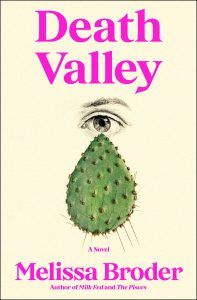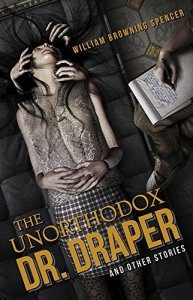Ian Mond Reviews Death Valley by Melissa Broder
 Death Valley, Melissa Broder (Scribner 978-1-66802-484-3, $27.00, 240pp, hc) October 2023.
Death Valley, Melissa Broder (Scribner 978-1-66802-484-3, $27.00, 240pp, hc) October 2023.
Melissa Broder has been on my need-to-get-around-to-reading radar since I picked up her 2018 debut, The Pisces, about a woman who falls in love with a merman. To this day, the book remains unopened on my Kindle. So does Broder’s second novel, Milk Fed, about a lapsed Jewish woman on a strict, calorie-controlled diet who engages in an unconventional relationship with the Orthodox Jewish woman who works at her favourite yogurt shop. When I saw the premise for Death Valley, I decided enough was enough; it was time to read Melissa Broder. And I was not disappointed. Death Valley is one of the funniest, most tender stories I’ve read about improbable cacti, dying fathers, and desert survival skills.
We first encounter Broder’s unnamed narrator as she rocks up to a Best Western in the Californian high desert. She’s told her family that the trip will help her figure out the ‘‘desert section’’ of her new novel. As our narrator informs us in a concise mental email, ‘‘five months ago, my father was critically injured in a car accident. Unfortunately, he is still in the ICU. As a result, I am overextended and cannot fulfill your request at this time.’’ It’s not just her father’s accident, though. Our narrator is also dealing with the lingering effects of drug addiction, her husband’s perpetual illness, and her mother’s all-consuming belief in bad omens (‘‘She’s descended from a long line of Jewish superstitionists… if you carry an umbrella: drought. If you don’t: monsoon’’). Following the advice of Jethra, the accommodating desk clerk at the Best Western, the narrator takes one of the more accessible trails near the motel, where she comes across a giant cactus, so large she can’t take a decent photo of it: ‘‘it’s like god or Ahab’s whale; I can only see it in parts.’’ On closer inspection, our narrator notices the cactus is sporting a vertical slash that, with some effort, is large enough for her to slide through into the plant’s cavernous, moist confines.
Death Valley is a story about grief, born out of the death of Broder’s father, who, as in the novel, spent the last months of his life in ICU. Justifiably, then, it could have been a morose book. As Broder’s protagonist points out, there’s nothing worse than reading a novel about someone unravelling that isn’t also enormously funny: ‘‘because how could a person unravel so humorlessly and not die? If I saw no humour inmy unravelling, I’d have been dead long ago.’’ It’s a perspective that Broder delivers on. The unnamed narrator’s struggle with her father’s situation and her mental health is juxtaposed with a series of hilarious observations ranging from the unifying design rules that characterise a Best Western lobby (‘‘Where wood can be fake, make it fake. Where linoleum can be used, use linoleum. If a geometric shape can be incorporated into any wall, rug, or floor tile, it’s going in’’) to her belief that Reddit holds the immutable truths of the universe (at least on the topics of botany, spousal love, and death). By far, it’s the narrator’s depiction of her mother’s fixation on curses, bad luck, and jinxes that made me laugh the most, particularly the mother’s twisting of the Yiddish term kinehora. It’s the Jewish equivalent of ‘‘knock on wood,’’ but she has redefined it to mean the opposite – believing that kinehora invokes the evil eye. A case in point: our narrator’s purchase of sweatpants for her father before leaving the hospital only tempts kinehora to keep him in the ICU for longer.
It’s not all jokes about Best Westerns and superstitious mothers. There’s also an impossible cactus. This irruption of the surreal forms the emotional core of Death Valley. I’m not going to tell you what our narrator witnesses inside the vast interior of the cactus, but it’s beautiful and unexpected: a moment of peace. Like the eye of a storm, though, the still-point is temporary. When later our narrator is lost in the desert, searching vainly for the cactus, all the doubts and fears come flooding back, her mental demons silenced only by a growing need to survive.
What I ultimately took from Death Valley was Broder’s nuanced and authentic portrayal of grief. Part of that comes from the narrator’s self-awareness: she knows her flaws (‘‘I am still the kind of person who makes another person’s coma all about me’’), and she has epiphanies (‘‘It had taken me years to see clearly that I was not the cause of my father’s depression’’). And part of it comes from the recognition that our narrator’s sadness will only ever reduce in intensity; the feelings never truly go away. The joy of reading Death Valley has convinced me that I need to read Broder’s two other novels and her poetry sooner rather than later.
Ian Mond loves to talk about books. For eight years he co-hosted a book podcast, The Writer and the Critic, with Kirstyn McDermott. Recently he has revived his blog, The Hysterical Hamster, and is again posting mostly vulgar reviews on an eclectic range of literary and genre novels. You can also follow Ian on Twitter (@Mondyboy) or contact him at mondyboy74@gmail.com.
This review and more like it in the October 2023 issue of Locus.
 While you are here, please take a moment to support Locus with a one-time or recurring donation. We rely on reader donations to keep the magazine and site going, and would like to keep the site paywall free, but WE NEED YOUR FINANCIAL SUPPORT to continue quality coverage of the science fiction and fantasy field.
While you are here, please take a moment to support Locus with a one-time or recurring donation. We rely on reader donations to keep the magazine and site going, and would like to keep the site paywall free, but WE NEED YOUR FINANCIAL SUPPORT to continue quality coverage of the science fiction and fantasy field.
©Locus Magazine. Copyrighted material may not be republished without permission of LSFF.






